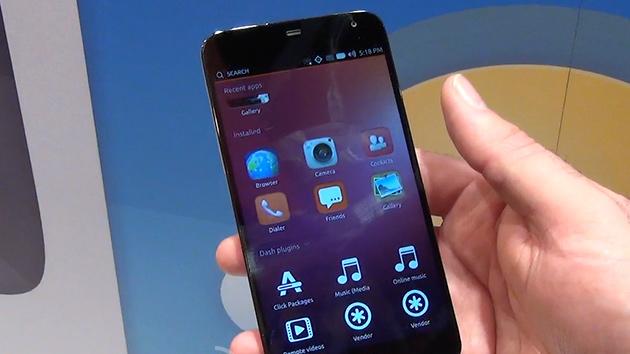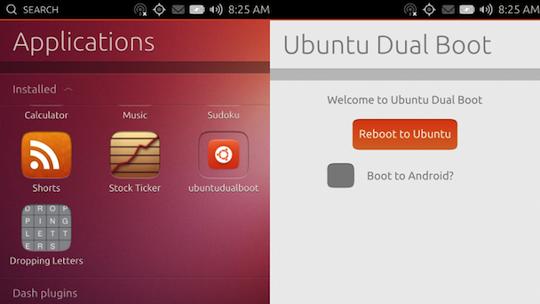Ubuntu
Latest

Ubuntu Phone review: years in the making, but still not consumer-ready
The smartphone arena is dominated by two operating systems. Gartner's latest figures show that during the first three months of 2015, iOS and Android devices accounted for almost 97 percent of global smartphone sales. With established alternatives from Microsoft and BlackBerry already fighting for the leftovers, there doesn't seem to be a whole lot of opportunity for new players. Canonical, maker of the popular Linux distro Ubuntu, is taking on the challenge regardless. With a version of Ubuntu built specifically for mobile, it's hoping to shake up the current duopoly with a fresh approach to content consumption. That's the plan, anyway, but after spending some time getting to know the OS, it's clear Canonical has a lot of work to do if Ubuntu Phone is ever going to be a viable option for even casual smartphone users.

The next Ubuntu phone is here, but you'll need an invite
Another Ubuntu phone, another unusual launch. After the BQ Aquaris E4.5, which debuted with a series of online flash sales, Canonical is following up with an invite-only handset built by Meizu. Yep, the same Meizu that once hoped to release an Ubuntu phone in 2014. The new MX4 "Ubuntu Edition" has been available to developers in China since May, but starting tomorrow you'll be able to order one in Europe too. At least, you will if you're lucky enough to receive an invite. Canonical and Meizu aren't revealing how many will be available each day, so you'll just have to visit their teaser site, complete the "origami wall" and hope for the best. The company is also staying tight-lipped about whether the invite system will eventually be dropped and if the MX4 will later be sold in other markets.

Latest Ubuntu hits the web with mostly minor refinements
Today's release of Ubuntu 15.04 is yet another installment in the slow and steady march forward from Canonical. The company knows that not every OS release needs to be accompanied by fanfare and dramatic changes to your desktop. And this edition of the popular Linux distro perfectly epitomizes that philosophy. There are basically zero user-facing interface changes, except for the ability to set application menus to always show, instead of only popping up when you mouse over them. Otherwise most of the changes are under the hood. The OS should be faster and more stable, thanks to updates to updates to the underlying system, like the Unity desktop and Linux kernel. The default apps also got some minor version bumps, including Firefox and LibreOffice.

Dell has a Linux version of its sleek XPS 13 laptop
The nearly bezel-less Dell XPS 13 is one of our highest rated laptops, thanks namely to its compact size, attractive design and fast performance. But if Windows just isn't your preferred operating system, now there's another option to choose from: Linux. As part of its commitment to the platform, which took off with the introduction of Project Sputnik, Dell's announced a Ubuntu-based developer edition of its sleek 13-inch laptop. Naturally, you'll have a myriad of configurations to choose from, with prices ranging from $949 all the way to $1,849, depending on how specced out you want your Linux machine to be.

Ubuntu's answer to Android is finally here, but it still needs work
At long last, the first Ubuntu phones are here. It's been more than two years since Canonical first showed off its Linux-based mobile platform, and fans have been clamoring for consumer devices ever since. The Ubuntu Edge never made its ambitious $32 million crowdfunding target, and the first handsets from BQ and Meizu were delayed last year. But finally, it's all starting to come together. BQ has started selling its "Aquaris E4.5 Ubuntu Edition" in Europe and Meizu shouldn't be too far behind with its modified MX4.

Daily Roundup: Inventor of the PC, Left Shark impostors and more!
Dr. Mark Dean helped design the first PC during his career at IBM and shares his thoughts on the future of the desktop computer. Meanwhile, Katy Perry's lawyers go after Left Shark impostors and students in Singapore make a 3D-printed solar powered car. Get all of today's top stories in the Daily Roundup.

The first Ubuntu phone arrives next week, but there's a catch
It's been a long time coming, but finally Canonical is ready to release its first Ubuntu phone. After teaming up with Meizu and BQ almost a year ago, we're getting a (sort of) new handset from the latter; it's actually a repurposed version of its Aquaris E4.5, a mid-range smartphone that normally ships with Android. The new "Ubuntu Edition" keeps all of the same hardware, which is nothing to write home about. It has a 4.5-inch, 540x960 resolution display, a 1.3GHz quad-core MediaTek Cortex A7 processor, 1GB of RAM and 8GB of internal storage. For shutterbugs, there's also a 8-megapixel rear-facing camera and a 5-megapixel snapper on the front. At €169.90 ($195), the specs are pretty unremarkable.

Ubuntu Linux is now ready to power your appliances and robots
Ubuntu Linux has spread to quite a few platforms in its 10-year history, if not always successfully. Today, though, the open source software is tackling what could be its greatest challenge yet: the internet of things. Canonical has released a version of its stripped-down snappy Ubuntu Core for connected devices like home appliances, robots and anything else where a conventional PC operating system wouldn't fly. It's designed to run on modest hardware (a 600MHz processor will do) and provide easy updates, all the while giving gadget makers the freedom to customize the software for whatever they're building. It promises to be extra-reliable, too -- it only applies updates if the code checks out, so you won't lose control of your smart thermostat due to a buggy upgrade.

Add-on lets your Chromebook run Linux in a window
You can already run a conventional operating system like Linux on your Chromebook if you're the determined sort, but it's not really convenient... not unless you like hopping between virtual terminals, anyway. However, there's now a relatively simple way to juggle between Chrome OS and Linux. If you grab a tweaked version of David Schneider's Crouton extension and type in a terminal command, you can now run a version of Linux (so far, Debian and Ubuntu) in a window. You won't have to drop that Hangouts chat just to finish some work in OpenOffice, in other words. While you'll still have to be comfortable with installing Linux in the first place, this could easily turn your cheap web surfing machine into more of a power user's tool. [Image credit: François Beaufort, Google+]

Ubuntu turns 10 with its latest release
Don't look now, but one of the staples of the open source world just marked a big birthday. Canonical has released Ubuntu 14.10, officially making this friendlier Linux distribution 10 years old. The company is clearly happy with a low-key celebration; 14.10's biggest addition is a developer tool center that makes it easier to write Android apps, while you'll also find support for zero-setup printers and 64-bit ARM chips. Not exactly riveting stuff, is it? Still, the release shows how far Ubuntu has come -- while there have been some rough patches in the last decade, the Canonical team can now focus most of its energy on refining a successful formula.

Netflix support comes to Ubuntu through Chrome
We told you it was coming, and now it's here! Canonical announced today that its popular Linux distro Ubuntu now supports Netflix playback through Chrome. If you're running a fully updated install of Ubuntu 12.04 LTS, 14.04 LTS or later you can simply go install Chrome 37 right now and immediately start enjoying Netflix. (Provided you're a paying subscriber, of course.) There's no word on if or when support might be coming to other browsers, so sorry Firefox fans. That being said, Mozilla is one of the main contributors to Network Security Services, which is key to Netflix support on Linux, so it probably won't be too far behind.

Netflix support is making its way to Linux, finally (updated)
Linux users, you've been very, very, very, very, very, very patient. And now, your patience is being rewarded with Netflix support on your OS of choice. For the longest time Netflix relied on Microsoft's would-be Flash competitor Silverlight. But, of course, support for the plug in was practically non-existent on the open-source OS. Now, with Silverlight fading, and Netflix embracing the power of HTML5, your wish of watching flicks in your favorite distro (be it Ubuntu, Mint or Arch) may finally come true. Paul Adolph from Netflix posted a message to Ubuntu developers, telling them that, "Netflix will play with Chrome stable in 14.02 if NSS version 3.16.2 or greater is installed."

Rest in peace Ubuntu for Android, we hardly knew ye
We can't say that the future of Ubuntu for Android ever looked particularly bright, but we were enamored with the concept. You'd walk around by day with a standard-issue Android phone in your pocket, but when you docked it to a keyboard, mouse and monitor, you were greeted with a full Ubuntu desktop experience. Well, Canonical has decided to put the project out to pasture apparently. Buried away in a recent bug report (now hidden from public view) was the fact that "Ubuntu for Android is no longer in development," and thus its landing page should be taken offline. Though some responses from the Canonical team appear to muddy the story, the take away is the same -- active development on Ubuntu for Android has come to a halt. It's not surprising considering that the company has invested heavily in its own smartphone OS, which already has a few OEMs signed on. Without a launch partner, the dual-boot solution never had a chance to take off, and Canonical clearly has other priorities now. Still, we mourn slightly for its passing. Here's hoping the concept lives on as an all-Ubuntu solution.

Ubuntu 14.04 is ready for a world filled with high-resolution touchscreens and tablets
Has it truly been six months already? It feel like just yesterday we were kicking the tires on a fresh install of Saucy Salamander. Now Canonical is pushing out the latest version of its popular Linux distro. Ubuntu 14.04 LTS (code named: Trusty Tahr) is part of its long term support series which means it will receive support and security updates for five years rather than the usual nine months. That's a major deal for companies using either on desktops and servers. But servers and enterprise desktops aren't where the excitement lies. What makes Trusty a huge deal for Canonical is that it finally makes the OS ready to use on touchscreens, high DPI displays and tablets. Until now Ubuntu didn't scale properly on high resolution displays (which this editor discovered the hard way when he installed it on his shiny new Carbon X1). The bigger news though is that 14.04 marks the first stable version of Ubuntu for tablets. The OS is packing a number of improvements to its touchscreen support, which will be essential when commercial tablets hit the market, which Canonical suggest will be happening this year in its press release. You can go download Ubuntu 14.04 now for free.

Canonical shutters Dropbox competitor Ubuntu One
Canonical announced plans today to shut down its Dropbox competitor Ubuntu One, a move that will also signal the end of its streaming music service. "If we offer a service, we want it to compete on a global scale," CEO Jane Silber noted in a blog post. "For Ubuntu One to continue to do that would require more investment than we are willing to make." Rather than compete with other cloud services that routinely offer substantial amounts of free storage, the company has instead decided to focus efforts on its operating system. Storage and music are no longer available for purchase from the Ubuntu One Store starting today. Existing customers can use the service until June 1st, while stored content will be available to download through July 30th. Annual subscribers, meanwhile, can expect a prorated refund soon.

What to expect from the first generation of Ubuntu smartphones (hands-on)
The Ubuntu Touch smartphone OS has come a long way, but it still has further to plod before it's ready for market - all Canonical will tell us that it hopes to see an Ubuntu phone before the end of this year. Nevertheless, now that some phone manufacturers are on board with the project, we've been able to play with a couple of prototypes: One was just a non-functioning handset from a Spanish company called BQ, showing off plain but solid build quality reflective of a mid-tier device. The other was more interesting -- a re-purposed Android handset from a second Ubuntu partner, Meizu, which makes light work of the operating system and interface. The UI itself hasn't changed a great deal since we last tried it, and neither has the underlying mission, which is to create an OS that extends seamlessly across phones, tablets and PCs, with virtually the same apps running on each type of screen. Check out the hands-on video below to get a better of what Canonical is aiming at, or -- if you don't mind getting your hands dirty -- try the new dual-boot developer preview for yourself on an Android handset.

Daily Roundup: Ubuntu's first phones, Lumia Icon review and more!
You might say the day is never really done in consumer technology news. Your workday, however, hopefully draws to a close at some point. This is the Daily Roundup on Engadget, a quick peek back at the top headlines for the past 24 hours -- all handpicked by the editors here at the site. Click on through the break, and enjoy.

Ubuntu phones arriving in 2014 from Meizu and BQ Readers
Canonical is finally poised to enter the mobile market. After years of teases, promises and demos, the company has locked up the first two manufacturers of Ubuntu phones. Meizu and BQ Readers will be releasing handsets with the Linux-based OS installed on them sometime in 2014. Details about release date, price and specs are still to be determined, but we were told to expect more info at Mobile World Congress (which kicks off this weekend). The list of supporting carriers also remains a mystery, but at least we know that there will be consumer-ready Ubuntu phones on the market before the end of the year. Mark Shuttleworth, Canonical's founder, is keeping things close to his chest, but he did say that two more manufacturers with "household names" should be coming on board in 2015. The bad news is that neither of these manufacturers has a large presence in US, so the chances of picking up a high-end Ubuntu phone on Verizon in 2014 is pretty slim. But Meizu is well established in China and should help the fledgling OS build visibility, while BQ Readers has a presence in Spain. Shuttleworth said that part of the reason these two particular companies were chosen was because of their "tactical" method for delivering handsets to specific markets with carefully targeted features and specs. The next big challenge will be luring developers to the ecosystem. Shuttleworth aims to have the top 50 mobile apps on Ubuntu by the end of the year, which is a noble, but ambitious goal. Right now, big names Evernote, LastPass and Grooveshark are already enlisted, but there's still a lot of work to do. Presumably Canonical still has a few cards up its sleeve for MWC, so stay tuned.

Canonical gives developers a preview of a dual-booting Ubuntu and Android future
Choice, friends, is good. Nobody likes being limited to one thing, when instead you could be picking from a plethora, or at least a pair of options. And it looks like Ubuntu is on track to deliver on its promise to offer a duo of operating systems to mobile devices in 2014, as it has released a developer preview of a dual-booting Android and Ubuntu mobile solution. While it's a developer-only release for now -- those familiar with unlocking phones and installing custom versions of Android should be fine, too -- using the feature is pretty simple once installed. No command line wizardry is needed: Simply open up the Ubuntu Dual Boot app and pick which OS you want to show up after restarting your phone. Looking for yet another toy with which to play on Christmas morn? The downloadables await at the source below.

Ubuntu finally embraces solid state drives as it preps for mobile push
Ubuntu is finally getting around to adding TRIM support, a pretty basic feature of most modern OSes. It's an essential command for maintaining the performance and health of solid state drives, since they operate in a fundamentally different way than your standard spinning-platter. This function allows an operating system to tell the drive which chunks of data are no longer necessary and are ready to be erased or over-written. That may sound a little obtuse, but essentially it means the disk needs to perform less writes, resulting in faster performance, longer life and less performance degradation over time. Windows added support way back in 2009, while OS X followed in 2011. Even Android jumped on the bandwagon back in July of this year, but Linux has lagged behind. Experimental support was added to the Linux kernel in 2008, but the feature is turned off by default due to performance concerns. And the option to enable it requires at least a moderate level of command line ninjutsu. Canonical has put a lot of work into getting TRIM support up to snuff, and finally feels it's ready for prime time. With the next version of Ubuntu, 14.04, it will be enabled by default, finally allowing its dedicated user base to fully realize the benefits of speedy, silent, power-sipping solid state storage. While the move is certainly later than many would have hoped, it comes at an opportune time as the company plans to make a serious mobile push. And, as we all know, solid state reigns supreme in the tablet and smartphone world.









